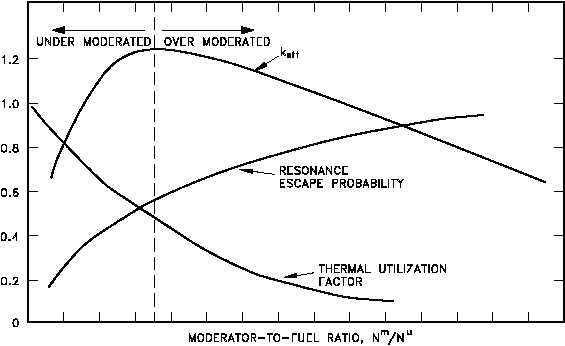Reactor Theory (Nuclear Parameters)
DOE-HDBK-1019/2-93
REACTIVITY COEFFICIENTS
Because the moderator-to-fuel ratio affects the thermal utilization factor and the resonance escape
Figure 2 Effects of Over and Under Moderation on keff
probability, it also affects keff. The remaining factors in the six factor formula are also affected
by the moderator-to-fuel ratio, but to a lesser extent than f and p. As illustrated in Figure 2,
which is applicable to a large core fueled with low-enriched fuel, there is an optimum point
above which increasing the moderator-to-fuel ratio decreases keff due to the dominance of the
decreasing thermal utilization factor. Below this point, a decrease in the moderator-to-fuel ratio
decreases keff due to the dominance of the increased resonance absorption in the fuel. If the ratio
is above this point, the core is said to be over moderated, and if the ratio is below this point, the
core is said to be under moderated.
In practice, water-moderated reactors are designed with a moderator-to-fuel ratio so that the
reactor is operated in an under moderated condition. The reason that some reactors are designed
to be under moderated is if the reactor were over moderated, an increase in temperature would
decrease the Nm/Nu due to the expansion of the water as its density became lower. This decrease
in Nm/Nu would be a positive reactivity addition, increasing keff and further raising power and
temperature in a dangerous cycle. If the reactor is under moderated, the same increase in
temperature results in the addition of negative reactivity, and the reactor becomes more
self-regulating.
Rev. 0
NP-03
Page 25


